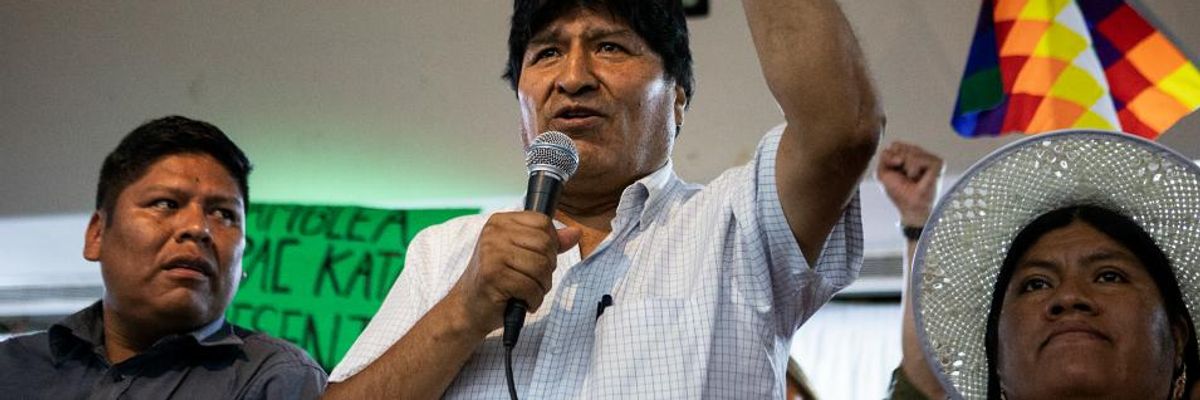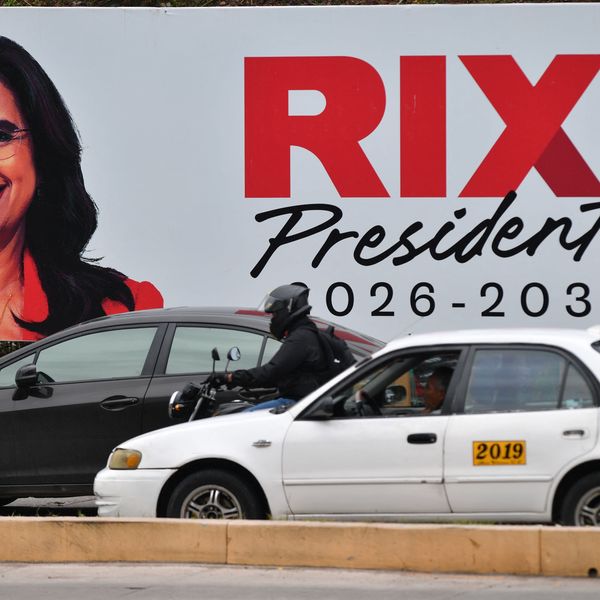
Former Bolivian President Evo Morales attends a press conference on January 19, 2020 in Buenos Aires, Argentina. (Photo: Matias Baglietto/NurPhoto via Getty Images)
'They Are Afraid of Democracy,' Says Evo Morales as Bolivian Tribunal Bars Him From Running for Senate
The former president of Bolivia called the Supreme Electoral Tribunal's decision "illegal and unconstitutional."
Former Bolivian President Evo Morales on Friday accused the country's Supreme Electoral Tribunal of being "afraid of democracy" after the seven-member body late Thursday barred Morales from running for Senate on the grounds that he did not meet residency requirements.
Morales, who is currently living in Argentina after being ousted in a military coup last November, said during a press conference in Buenos Aires on Friday that the tribunal's decision was "illegal and unconstitutional" and alleged the U.S. government was involved in the ruling.
In a tweet Thursday night, Morales called the decision a "blow to democracy."
"The members of the TSE know I meet the requirements to be a candidate," added Morales, Bolivia's first indigenous president. The former president claimed that the ultimate goal of the current right-wing government of Jeanine Anez is to ban the Movement for Socialism (MAS), Morales' left-wing political party.
In December, the Anez government issued an arrest warrant against Morales, accusing the former president of "terrorism and sedition."
\u201cBolivia's only elected president, Evo Morales, characterized his ban from running as a Senate candidate as an assault on democracy. "They are afraid of democracy," he said in a presser in Buenos Aires. He accused the Electoral Court of submitting to the dictatorship and US gov't.\u201d— Ben Norton (@Ben Norton) 1582298627
Bolivian elections are set for May 3, the first contest since the November coup that deposed Morales and paved the way for Anez to declare herself interim president. Bolivian lawmakers in November approved a measure calling for the new elections and barring Morales from participating.
Anez announced last month that her name will be on the presidential ballot in May after previously suggesting it would be improper for her to run.
A poll by Ciesmori released earlier this week found that Luis Arce, the MAS presidential candidate, is leading the presidential field with 31.6 percent support. Former Bolivian President Carlos Mesa polled in second place with 17% support and Anez ranked third with 16% support.
The ouster of Morales in November was followed by massive military and police repression of indigenous Bolivians, who took to the streets among others to voice opposition to the right-wing government. Days after declaring herself interim president on Nov. 12, Anez issued a decree shielding military and law enforcement from prosecution for gunning down demonstrators.
Earlier this week, Morales tweeted that in just three months in power the Anez government has "destroyed" the economic and social welfare policies he put in place during his nearly 14 years as president.
"This situation hurts us a lot," Morales said. "They want to get rid of all our social programs and privatize them."
An Urgent Message From Our Co-Founder
Dear Common Dreams reader, The U.S. is on a fast track to authoritarianism like nothing I've ever seen. Meanwhile, corporate news outlets are utterly capitulating to Trump, twisting their coverage to avoid drawing his ire while lining up to stuff cash in his pockets. That's why I believe that Common Dreams is doing the best and most consequential reporting that we've ever done. Our small but mighty team is a progressive reporting powerhouse, covering the news every day that the corporate media never will. Our mission has always been simple: To inform. To inspire. And to ignite change for the common good. Now here's the key piece that I want all our readers to understand: None of this would be possible without your financial support. That's not just some fundraising cliche. It's the absolute and literal truth. We don't accept corporate advertising and never will. We don't have a paywall because we don't think people should be blocked from critical news based on their ability to pay. Everything we do is funded by the donations of readers like you. Will you donate now to help power the nonprofit, independent reporting of Common Dreams? Thank you for being a vital member of our community. Together, we can keep independent journalism alive when it’s needed most. - Craig Brown, Co-founder |
Former Bolivian President Evo Morales on Friday accused the country's Supreme Electoral Tribunal of being "afraid of democracy" after the seven-member body late Thursday barred Morales from running for Senate on the grounds that he did not meet residency requirements.
Morales, who is currently living in Argentina after being ousted in a military coup last November, said during a press conference in Buenos Aires on Friday that the tribunal's decision was "illegal and unconstitutional" and alleged the U.S. government was involved in the ruling.
In a tweet Thursday night, Morales called the decision a "blow to democracy."
"The members of the TSE know I meet the requirements to be a candidate," added Morales, Bolivia's first indigenous president. The former president claimed that the ultimate goal of the current right-wing government of Jeanine Anez is to ban the Movement for Socialism (MAS), Morales' left-wing political party.
In December, the Anez government issued an arrest warrant against Morales, accusing the former president of "terrorism and sedition."
\u201cBolivia's only elected president, Evo Morales, characterized his ban from running as a Senate candidate as an assault on democracy. "They are afraid of democracy," he said in a presser in Buenos Aires. He accused the Electoral Court of submitting to the dictatorship and US gov't.\u201d— Ben Norton (@Ben Norton) 1582298627
Bolivian elections are set for May 3, the first contest since the November coup that deposed Morales and paved the way for Anez to declare herself interim president. Bolivian lawmakers in November approved a measure calling for the new elections and barring Morales from participating.
Anez announced last month that her name will be on the presidential ballot in May after previously suggesting it would be improper for her to run.
A poll by Ciesmori released earlier this week found that Luis Arce, the MAS presidential candidate, is leading the presidential field with 31.6 percent support. Former Bolivian President Carlos Mesa polled in second place with 17% support and Anez ranked third with 16% support.
The ouster of Morales in November was followed by massive military and police repression of indigenous Bolivians, who took to the streets among others to voice opposition to the right-wing government. Days after declaring herself interim president on Nov. 12, Anez issued a decree shielding military and law enforcement from prosecution for gunning down demonstrators.
Earlier this week, Morales tweeted that in just three months in power the Anez government has "destroyed" the economic and social welfare policies he put in place during his nearly 14 years as president.
"This situation hurts us a lot," Morales said. "They want to get rid of all our social programs and privatize them."
Former Bolivian President Evo Morales on Friday accused the country's Supreme Electoral Tribunal of being "afraid of democracy" after the seven-member body late Thursday barred Morales from running for Senate on the grounds that he did not meet residency requirements.
Morales, who is currently living in Argentina after being ousted in a military coup last November, said during a press conference in Buenos Aires on Friday that the tribunal's decision was "illegal and unconstitutional" and alleged the U.S. government was involved in the ruling.
In a tweet Thursday night, Morales called the decision a "blow to democracy."
"The members of the TSE know I meet the requirements to be a candidate," added Morales, Bolivia's first indigenous president. The former president claimed that the ultimate goal of the current right-wing government of Jeanine Anez is to ban the Movement for Socialism (MAS), Morales' left-wing political party.
In December, the Anez government issued an arrest warrant against Morales, accusing the former president of "terrorism and sedition."
\u201cBolivia's only elected president, Evo Morales, characterized his ban from running as a Senate candidate as an assault on democracy. "They are afraid of democracy," he said in a presser in Buenos Aires. He accused the Electoral Court of submitting to the dictatorship and US gov't.\u201d— Ben Norton (@Ben Norton) 1582298627
Bolivian elections are set for May 3, the first contest since the November coup that deposed Morales and paved the way for Anez to declare herself interim president. Bolivian lawmakers in November approved a measure calling for the new elections and barring Morales from participating.
Anez announced last month that her name will be on the presidential ballot in May after previously suggesting it would be improper for her to run.
A poll by Ciesmori released earlier this week found that Luis Arce, the MAS presidential candidate, is leading the presidential field with 31.6 percent support. Former Bolivian President Carlos Mesa polled in second place with 17% support and Anez ranked third with 16% support.
The ouster of Morales in November was followed by massive military and police repression of indigenous Bolivians, who took to the streets among others to voice opposition to the right-wing government. Days after declaring herself interim president on Nov. 12, Anez issued a decree shielding military and law enforcement from prosecution for gunning down demonstrators.
Earlier this week, Morales tweeted that in just three months in power the Anez government has "destroyed" the economic and social welfare policies he put in place during his nearly 14 years as president.
"This situation hurts us a lot," Morales said. "They want to get rid of all our social programs and privatize them."

